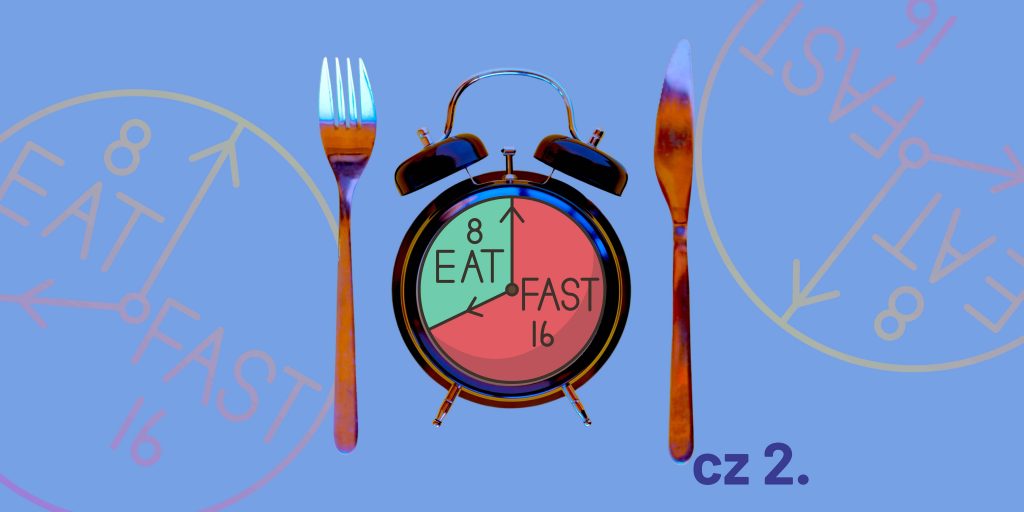How intermittent fasting works?

Intermittent fasting (IF) part 2
Intermittent Fasting (IF), or intermittent fasting, is a dietary model that has been popular for several years, which involves restricting food intake to certain hours of the day (e.g. 4:8pm) or certain days of the week (e.g. 5:2am). You can find out more about who this is good for and the benefits of following it in the first part of our series of articles What is intermittent fasting. In this part, however, we want to introduce you to how fasting works on the body and why you actually lose weight on it.
How does it work?
When thinking about the influence of intermittent fasting on the process of losing weight, we should consider two aspects or hypotheses of its action. Firstly, the psychodietetic aspect, concerning the issue of limiting calorie intake. The fact that there is a longer fasting period and a shorter food window means that we consume fewer kcal per day and naturally create an energy deficit, just like on a normal weight loss diet. You can read more about this in the article What is intermittent fasting. Secondly, the physiological aspect, which assumes that fasting has a beneficial effect on metabolic processes in the body. According to this hypothesis, when comparing IF to a non-fasting diet with the same energy requirements, the IF model shows a more beneficial effect on body composition parameters and health in general.
Do studies confirm the advantage of intermittent fasting (IF) over a normal diet?
There has been a lot of research on IF in the context of weight loss over the years and much of it shows the advantage of intermittent fasting over other dietary models, but meta-analyses do not confirm this. The only exception is a meta-analysis that compared the effects of intermittent fasting and low-energy diets (less than 800 kcal) on weight loss over 12 weeks. The study showed that this may have a beneficial effect for some patients, but clinical trials are still needed to better assess the effectiveness of these two approaches.
However, it is worth noting that the meta-analysis mentioned above covers a very short period of time (12 weeks), while a longer one (over 6 months) does not show an advantage of using IF over a regular weight loss diet.
So is intermittent fasting (IF) worth it?
The dietary model and the diet should be individually tailored to each person, so only you can decide if this model is right for you. As you can see, looking from the scientific angle, there is no evidence that IF is more effective than classical weight loss diets, however, taking into account the psychodietetic aspect, e.g. limiting snacking, it can have a beneficial effect on the weight loss process.
Read more about who IF is for and who should not follow it and its benefits, as well as the types of fasting in Fitatu.
Fitatu App
Download the application from the Play Store or Apple Store and start counting your macros with us!
Do you prefer the web version? No problem. A basic web version is prepared for our subscribers. And now you can use the IF-B discount code by going to https://www.fitatu.com/app/giftcode and get Fitatu Premium for 5,17€/month
What else can you find in Fitatu Premium?
- over 1000 recipes plus several new ones every month
- additional plans for intermittent fasting
- the ability to create shopping lists
- a choice of six ready-made menus full of meals to choose
- filtering products and recipes
- more synchronization with fit apps
- access to the application in the web version
- no ads!
Bibliography:
- Harris L, McGarty A, Hutchison L, Ells L, Hankey C. Short-term intermittent energy restriction interventions for weight management: a systematic review and meta-analysis. Obes Rev. 2018;19(1):1-13.
- Headland M, Clifton PM, Carter S, Keogh JB. Weight-loss outcomes: a systematic review and meta-analysis of intermittent energy restriction trials lasting a minimum of 6 months. Nutrients. 2016;8(6).
- Alhamdan BA, Garcia-Alvarez A, Alzahrnai AH, et al. Alternate-day versus daily energy restriction diets: which is more effective for weight loss? A systematic review and meta-analysis. Obes Sci Pract. 2016;2(3):293-302.





